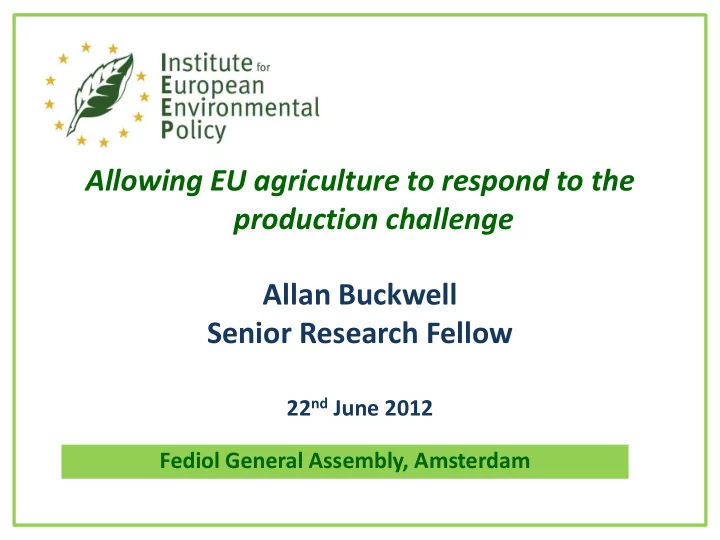

Allowing EU agriculture to respond to the production challenge Allan Buckwell Senior Research Fellow 22 nd June 2012 Fediol General Assembly, Amsterdam
Allowing EU agriculture to respond to the production challenge • The production challenge • The EU policy stance • Is EU arable agriculture sustainable? • environmentally unsustainable • economically unsustainable • What do we have to do? • Does the current reform proposal help? Agriculture and Land Management
Global and EU production challenge • The 2007/8 price spike – over-excitement? • Price volatility certainly increased • Is pressure of demand growth really exceptional? • Population growth slowing • Income growth sluggish • Bioenergy demands • The ‘new’ factors are environmental /resource limits • Climate change • Water availability (or excess – floods) • Phosphates • Biodiversity • The EU contribution? Agriculture and Land Management
EU policy stance • What is the EU strategy for agriculture? • Competitiveness • Sustainablility • Sustainable intensification? • Sustainable competitiveness and innovation? • Where is the emphasis? • No agreement amongst stakeholders • Farmers point to food security • Environmentalists point to environmental damage • Specific policy signals? Ciolos 2011 proposals – CAP greening? Agriculture and Land Management
Is EU arable agriculture sustainable? • If it clearly is, then why the constant questioning? • What is sustainable development ? • Brundtland Report for UN (1987) : “ development which meets the needs of the present generation without compromising the ability of future generations to meet their needs “ • Equal weight to economic, environmental and social? Link to natural capital : if this is used up faster than it is replenished then the situation is unsustainable. • Economists define weak & strong sustainability Agriculture and Land Management
Environmentally unsustainable ? • Who says? European environment agency • European consumption still highly unsustainable … • Europe’s demand for resources reaching far beyond its borders… • World remains on unsustainable path …UNEP report • Indicators of environmental ‘damage’ • Water Exploitation Index • Water contamination: river N concentration, triazine in groundwater • Soil organic matter • GHG emissions • Agricultural land use intensities • Livestock intensities • Farmland birds, butterflies • Natura 2000 sites in unfavourable condition • Does this constitute irreversible damage of natural capital? Agriculture and Land Management
Economically unsustainable ? • Farm incomes low, variable and wide distribution of performance • High dependency on CAP payments which are vulnerable • Farm structure: fragmentation, demographics • Policy structure which raises production costs (land rent) and institutionalises dependency Agriculture and Land Management
What has to be done? • Discover and implement sustainable intensification • In EU little or no new land, rather land release for development and for ‘nature’ • Precision land management • appropriate production structures for investment required • R&D – especially with respect to N2O and CH4 • knowledge transfer • information (incentives already there) • mostly private not public; down from the input suppliers up from the processors • Combining private ownership/action and collective provision of public goods Agriculture and Land Management
Overcoming the double denial • Agriculturalists that there is a sustainability challenge • Environmentalists that there is a production challenge • We’ve come a long way since Silent Spring • But there is still a long way to go • Consumer reactions to new technology is led and sustained by the greens Agriculture and Land Management
Meanwhile the Ciolos CAP reform • Two necessary steps: • Redistribution of the supports • Legitimising the policy • Many non-central gestures: • Active farmer & payment capping • Young farmers & small farmers, • Coupled payments & areas of natural constraints • Policy interventions to correct what markets will not deal with • Environmental externalities • Market imperfections • Risk management ? • Can farms be viable if they depend on subsidy? Agriculture and Land Management
Does greening threaten competitiveness? • The proposal: • Most farms to do APBCE for 30% of payments • Crop diversification - do farmers mono-crop oilseeds? • Retain permanent pasture – aimed at DE maize for AD • 7% ecological focus area • Political process underway • More exemptions, green by definition • Crop Divers. being tempered • EFA the least defined – relation to existing features? • Production threat is, max., three years productivity gain? • Not aimed at competitiveness, concern is they won’t help sustainability Agriculture and Land Management
Concluding remarks • European agriculture is amongst the most intensive in the world • Driven by European technology and policy • Sustainable intensification in Europe should focus on the sustainable part of sustainable intensification • Must expect that the rest of the world will not catch up with this until much later. • Having said all this, with fears of recession turning to depression environment slips in the political agenda. Agriculture and Land Management
Allan Buckwell abuckwell@ieep.eu For further information on the future CAP debate visit www.cap2020.ieep.eu OR IEEP’s web -site for Publications, News and Newsletter on all dimensions of EU environmental policy www.ieep.eu 13
Recommend
More recommend